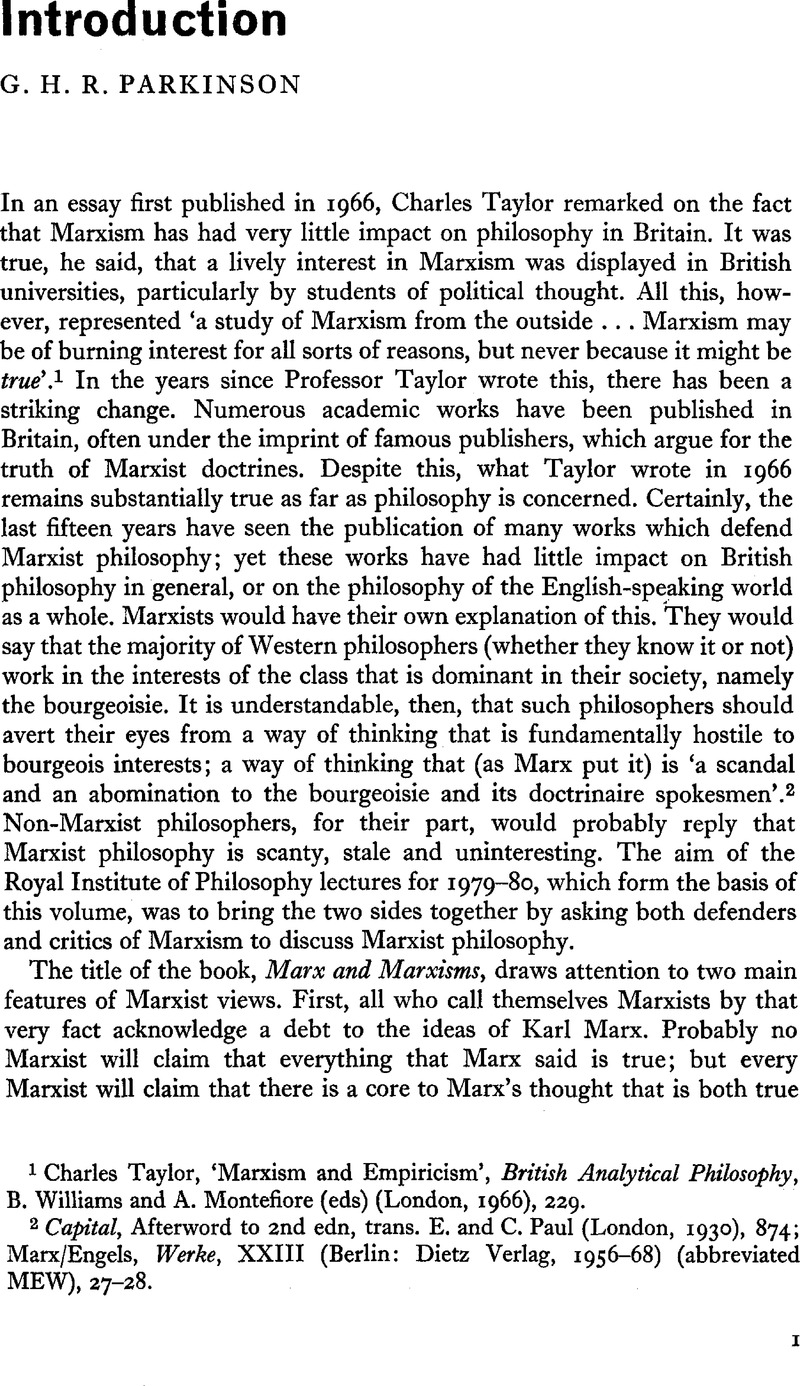No CrossRef data available.
Published online by Cambridge University Press: 08 January 2010

1 Taylor, Charles, ‘Marxism and Empiricism’, British Analytical Philosophy, Williams, B. and Montefiore, A. (eds) (London, 1966), 229.Google Scholar
2 Capital, Afterword to 2nd edn, trans. , E. and Paul, C. (London, 1930), 874Google ScholarPubMed; Marx, /Engels, , Werke, XXIII (Berlin: Dietz Verlag, 1956–1968) (abbreviated MEW), 27–28.Google Scholar
3 Quoted by Engels in a letter to Schmidt, C., 5 08 1890.Google Scholar
4 Since Professor Edgley read his paper in October 1979, the French Communist Party has given its support to the Russian invasion of Afghanistan, and it has been argued that Eurocommunism has little political significance without French support (The Times, 10 and 16 01 1980).Google Scholar
5 Cf. Lire le Capital (Reading Capital), English translation (London, 1970), 180.Google Scholar
6 The passage discussed by Sartre is Marx's account of the development of Roman society, contained in his letter to the editors of Otechestvenniye Zapiski, 11 1877Google Scholar. Marx, and Engels, , Selected Correspondence (Moscow and London, n.d.), 379Google Scholar; MEW, XIX, III.
7 Hegel, , Phänomenologie des Geistes, 6th edn, Hoffmeister, (ed.) (Hamburg, 1952), 20, 29Google Scholar. Cf. Marcuse, H., Reason and Revolution, 2nd edn (London, 1955), 282Google Scholar: ‘For Marx, as for Hegel, the dialectic takes note of the fact that the negation inherent in reality is “the moving and creative principle”. The dialectic is “the dialectic of negativity”’. See also Marx, , Economic and Philosophical Manuscripts (1844)Google Scholar; Marx, and Engels, , Collected Works, III (Moscow and London, 1975– ), 332.Google Scholar
8 Cf. Cohen, , op. cit., 152Google Scholar. In defending his ‘development thesis’ Cohen appeals, not just to the view about human nature discussed by Dr Gray, but to ‘one fact about the situation human beings face in history’—namely, that the historical situation of man is one of scarcity.
9 In his book The Poverty of Theory (London, 1978)Google Scholar. This point is made by a Marxist critic of Anderson, Thompson Perry, in his Arguments within English Marxism (London, 1980), 49ff.Google Scholar
10 Lenin, , Proletarian Revolution and the Renegade KautskyGoogle Scholar; Lenin, , Selected Works, VII (London, 1937), 149.Google Scholar
11 He calls this teleological view a ‘mythological strand’ in Marx's thought.
12 In his book Praxis and Method (London, 1979), 259Google Scholar, he says that sociologists are mistaken in affirming that the analysis of society is one thing and that the making of value-judgments is another. But Marxists have been prevented, by the conceptual baggage that they have taken over from Marx, from developing a new theory that is appropriate to the present day.
13 A recent and eloquent example of this is Dr G. A. Cohen's 1980 Isaac Deutscher Memorial Lecture, ‘Freedom, Justice and Capitalism’ (New Left Review, No. 126 (03/04 1981), 3–16).Google Scholar
14 Reprinted in Berlin, Isaiah, Four Essays on Liberty (Oxford, 1969).Google Scholar
15 Engels, , Ludwig Feuerbach and the End of Classical German Philosophy, MEW, XXI, 270Google Scholar; Marx, and Engels, , Selected Works, II (Moscow and London, 1950), 331.Google Scholar
16 Anti-Dühring, Engels, MEW, XX, 24Google Scholar; English trans. (London, 1934), 31.
17 Althusser, , Lenin and Philosophy, English trans. (London, 1971), 59.Google Scholar
18 Feuerbach, Ludwig, MEW, XXI, 275Google Scholar; Marx, and Engels, , Selected Works, II, 335Google Scholar. Compare Althusser, , Lenin and Philosophy, 55.Google Scholar
19 Lenin, , Materialism and Empirio-CriticismGoogle Scholar; Lenin, , Collected Works, XIV, English trans. (Moscow and London, 1962), 326.Google Scholar
20 Anti-Dühring, MEW, XX, 129; English trans., 155.Google Scholar